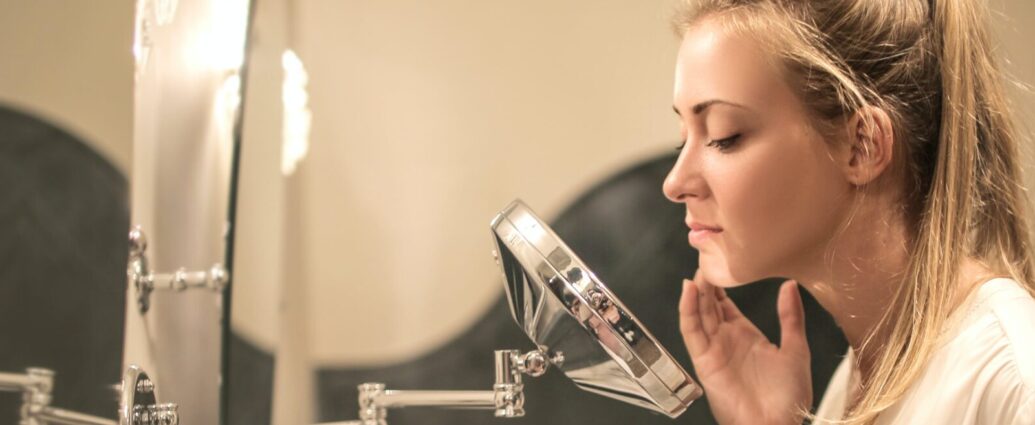Imogen Webb
Acne is a daily struggle for many people all around the world. So why does it feel so isolating?
According to the NHS, 95 per cent of people between the ages of 11 and 30 are affected by some form of acne. While most will frantically turn to skincare and vitamins to fix ‘imperfections’, they forget that their skin doesn’t define them.
Sometimes it’s necessary to put down the stripping serums and instead learn that acceptance is half of the battle.
Growing up with Acne
For those who haven’t experienced hormonal acne, communicating the extent of the distress is challenging, as the majority of the anguish manifests mentally rather than physically.
From the age of 11, every day of my life became a constant battle between my self-esteem and my acne – right in time for secondary school. After spending my pocket money on all the scrubs and masks I could get my hands on, I soon realised that this was not going to be a quick fix.
From the age of 13, I grew to accept that my acne would always be that little bit worse when my period rolled around, or when I was having a particularly tricky time with my hormones.
Normalizing acne for the girls that suffer with it 🖤🫶 pic.twitter.com/RzFt7sZHBw
— ⛧𝓖𝓲𝓰𝓲 ✞ ✮Loves YungScuff!!! (@YungScuffed) February 3, 2024
From the age of 15, I had heard every cliché under the sun. After dedicating most of my morning to completing a carefully planned out skincare routine I was still being presented with the holy grail of acne advice: “Why don’t you just wash your face?” Some comments were even more creative than that. I learnt that, after some debate, the spots scattered across my forehead did in fact look more like Orion than the Big Dipper constellation. Score.
After skipping classes and crying on the way to social events, I finally decided at 18 that enough was enough. My desire to live life as I deserved had finally overruled letting my acne dictate my plans. Although learning about my skin and the ingredients which worked best for me did help, the deciding factor was my mindset.
Breaking the Cycle
Unfortunately, there usually isn’t one root cause of acne. According to Cleveland Clinic, there are numerous triggers such as food and diet, hormone activity, and even air pollution and weather conditions. Accepting that some of the triggers are simply out of your control is the first step to realising that you can stop taking your acne out on yourself. From my experience, my misunderstanding of what was triggering my breakouts became a constant stress factor in my life.
As I became increasingly stressed at the effort to clear my complexion, my acne got worse and my stress levels increased. Stress, according to Temple Clinic, has a recorded negative effect on acne. From poor quality of sleep, to an increase in stress hormones that directly influence sebaceous glands, to an imbalance of gut bacteria, stress is a crucial factor that can worsen acne.
“handle these comments with resilience, and remember everyone is on their own journey”
Acne Representation
According to a survey by the Dove Self-Esteem Project, 90 per cent of girls say they follow at least one social media account which makes them feel less beautiful.
As such, following accounts that de-stigmatise negative perceptions of acne is a great way to fuel a change in your mindset. TikTok users such as @sophiedove2 are making waves on social media by trying out makeup trends typically reserved for those with “clear” skin on more natural, blemished skin.
https://www.tiktok.com/@sophiedove2/video/7319620551708904736?is_from_webapp=1&sender_device=pc&web_id=7322876651505829408
Other users such as @prettyprogress23 have created platforms that showcase their journey towards body-confidence.
@prettyprogress23 Woke up with a huge zit and went makeup free! Pimples can be so annoying but dont let this impact your day. Its all about your energy baby! #holidays #europe #dontwaittobehappy #acneprone
Finding skincare that works for you
Learning your skin type is the first step to learning which skincare ingredients will work for you. Both your skin and your bank account will thank you. Here’s a list of some acne-prone skin favourites and trends to follow which may help on this journey:
- Niacinamide: The holy grail for acne-prone skin. According to healthline, this ingredient regulates oil, minimises pore appearance and redness, and treats hyperpigmentation.
- Salicylic Acid: A skin exfoliant to promote the skin’s natural exfoliation. According to healthline, this ingredient works to dissolve dead skin cells which may be clogging pores.
- ‘Korean Skincare’: A recent trend that has taken the world of skincare by storm. According to Refinery29, in comparison with Western skincare, “Much of Korean skincare shines a light on reducing inflammation rather than drying out the skin”. Remember though, as with all skincare, there are some products and brands which work better than others.
- Hydrocolloid patches: A new colourful and fun way to protect your spots from restless fingers. Now available in all different shapes and colours, some of these patches even contain tea tree or salicylic acid. These are perfect for preventing scarring.
It’s important to remember that you are worth far more than your acne. Adapting your skincare is only half the battle. True confidence has to start from within.
READ NEXT:
-
THE CURLY GIRL METHOD: PRACTICE MAKES PERFECT
-
NAVIGATING CONVERSATIONS ON COSMETIC PROCEDURES
-
THE BEST STUDY ALTERNATIVES TO COFFEE SHOPS
Featured image courtesy of Photo by Andrea Piacquadio on Pexels. No changes were made to this image. Image licence found here.

